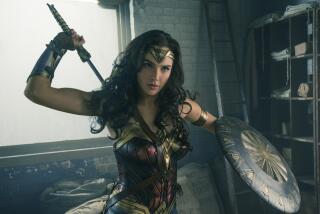Video Game Firms Power Up
- Share via
Lost in the carnage of the technology-stock slaughter has been one of the best-performing sectors of the stock market: video games.
Shares of the top 10 independent U.S. game publishers have surged 69% during the last year, with two Southland companies--Activision Inc. and THQ Inc.--leading the charge. The Nasdaq composite index, by comparison, executed a 46% belly-flop in the same period.
Behind the impressive numbers, however, is a story of an industry in the throes of frantic consolidation. Wall Street is richly rewarding game publishers that are building enough bulk to survive, and punishing ones that don’t appear to have enough resources to weather the storm. But today’s hunter could be tomorrow’s prey.
“Those who make the right decisions and manage through it most effectively will suffer the least amount of pain,” said Jeff Lapin, chief operating officer of THQ in Calabasas Hills. “There tends to be a natural separation of the haves and have-nots during the transition.”
The haves include Electronic Arts Inc. of Redwood City, Calif., THQ and Santa Monica-based Activision, whose shares hit an all-time high Friday. Activision has steadily increased revenue, hit its profit targets and snagged rave reviews for its smash hit series, “Tony Hawk Pro Skater.”
On the endangered-species list, according to industry analysts, are 3DO Co. in Redwood City; Acclaim Entertainment Inc. in Glen Cove, N.Y.; Midway Games Inc. in Chicago, which is 30% privately owned by media mogul Sumner Redstone; and Interplay Entertainment Corp. in Irvine. Shares of Interplay and Acclaim are trading below $2, while 3DO is floating just above $2, making them inexpensive targets.
“It has become a highly competitive business,” Activision Chief Executive Robert “Bobby” Kotick said. “Retailers are less forgiving of products that don’t immediately fly off the shelves. Developers are choosier about who they work with. And the costs of developing games are going through the roof, so the barriers to entry have become prohibitive. For many companies, it’s going to be survival--at best.”
More than a half-dozen notable game companies already have been snapped up during the last year. Infogrames acquired GT Interactive and Hasbro Interactive. Activision bought Neversoft and Raven Software. Electronic Arts purchased DreamWorks Interactive, Kesmai, PlayNation and Pogo.com. Take-Two Interactive Software Inc. in New York has been on a buying spree, purchasing 26 companies in the last four years.
“It makes perfect sense for there to be continued consolidation,” said Kelly Sumner, Take-Two’s chief executive, who declined to comment on his company’s future.
Activision, the maker of “Cabela’s Big Game Hunter,” itself became something of a prime target. It recently rebuffed a $25-a-share offer from Pacific Century CyberWorks, a Hong Kong telecommunications behemoth, according to executives familiar with the discussions. There also have been tentative talks to be acquired by Konami Corp., Japan’s largest independent game publisher, the executives said. And last year, Activision, Midway and THQ explored a three-way merger, according to company officials.
Activision, Konami, Midway and THQ declined to comment. Pacific Century Cyberworks did not return calls.
Though none of the discussions resulted in a deal, they did spur a quick run-up of Activision’s stock. Its shares hit an all-time high Friday of $26.97 on Nasdaq after hovering in the low to mid-teens for the last half of 2000. Based on Friday’s closing price, the company’s market value tops $700 million.
The industry’s video game sales, however, stumbled 5% last year, to $6 billion, as consumers throttled back spending and saved their money for this year’s batch of next-generation game consoles.
With software sales not expected to recover substantially until the end of this year after the new consoles roll out, publishers have been engaging in their own game of survival, the denouement of which is only now occurring. From this period will emerge a set of winners and losers. The latter could be gobbled up for pennies on the dollar.
Potential buyers include not only large independent publishers such as Electronic Arts and Infogrames Inc. but also well-capitalized makers of game consoles such as Sony Corp. and Microsoft Corp., as well as media companies such as Vivendi Universal, which owns game publishers Universal Interactive Studios, Blizzard Entertainment and Sierra Interactive.
No company is immune from the consolidation craze. Even the industry’s biggest player, Electronic Arts, with $1.5 billion in annual revenue, is but a minnow in the pool of media giants that include companies such as Vivendi Universal and AOL Time Warner, whose annual revenue is in the $40-billion range.
“There are a half-dozen publishers out there with a high likelihood of being acquired or merged,” said Larry Marcus, a partner with WaldenVC, a venture capital firm in San Francisco.
Activision hasn’t always been a prime catch. Founded in 1979, Activision went public in 1983 only to land in Chapter 11 Bankruptcy Court protection in 1990. Chief Executive Kotick, who at the time was a 26-year-old University of Michigan dropout, bought a controlling stake in the company for about $500,000. Kotick, 38, now owns 15% of Activision. He declined to comment on the company’s merger plans.
The company so far remains a survivor. Activision correctly anticipated that growth would come from simpler, mainstream games based on well-known licensed properties such as “Spider-Man” and “Toy Story 2.” It refrained from spending too much to develop games for Sony’s PlayStation 2, a console that initially hit production snafus when it was released in the U.S. in October.
The delays in cranking out PlayStation 2 consoles crimped software sales during the crucial holiday season and punished companies such as Electronic Arts that relied too heavily on sales of the console. Instead, Activision developed games for older, more widely available consoles, concentrating on the extreme-sports genre. It struck gold with its Tony Hawk skateboarding games.
Activision’s revenue for fiscal year 2001 ended March 31 is expected to exceed last year’s sales of $572 million, and net income is forecasted at 74 cents a share, or just under $20 million, compared with a net loss of $34 million in fiscal 2000. Despite a $36-million operating gain that year, Activision took a $42-million write-off for its purchase of Expert Software and a $28-million one-time restructuring charge.
Kotick “has made some very good decisions in terms of managing the company through the transition,” said Miguel Iribarren of Wedbush Morgan Securities in Los Angeles. “He focused on licensed content, and he didn’t commit too many resources to the PS2 platform early on. This company is one of the best-looking stocks right now in the sector.”
THQ, founded in 1990 by an executive from the toy industry, has survived the recent famine by developing games based on popular licenses, such as “WWF Smackdown!” and “A Bug’s Life.” Its WWF games alone accounted for more than one-fifth of its $347 million in sales last year.
Though profit fell 42% last year to $18.2 million, revenue rose 14%. With the coming of new consoles, such as Microsoft’s Xbox and Nintendo’s Gamecube, and the proliferation of Sony’s PlayStation 2, confident THQ executives this week told analysts they have successfully weathered the storm and are expecting margins to increase every quarter this year.
(BEGIN TEXT OF INFOBOX / INFOGRAPHIC)
Nasdaq Goes Down ...
The technology-laden index has lost nearly half its value in the past year.
*
Weekly closes of Nasdaq
Friday: 2,075.68
*
... but Games Score
Meanwhile, the video game sector has thrived.
Weekly closes, index of 10 game stocks*
Friday: 159.81
*
*Companies in game index are Acclaim, Activision, Eidos, Electronic Arts, Infogrames, Interplay, Midway Games, Take-Two Interactive Software, THQ and 3DO.
Source: Bloomberg News






